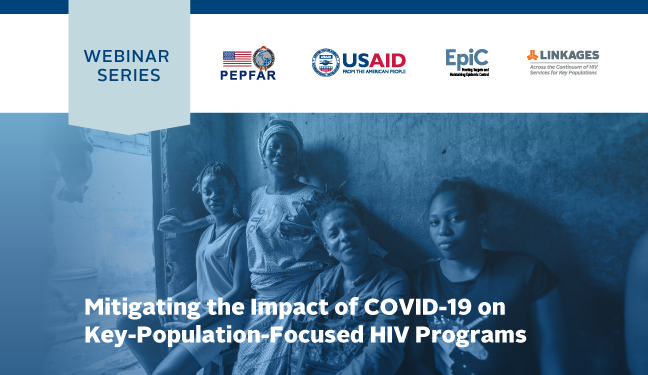Webinar hosted by the LINKAGES and EpiC projects as part of the Key Populations: Evidence in Action series.
To access the audio recording of the webinar, please click here.

On April 8th, the USAID– and PEPFAR-supported LINKAGES and EpiC projects hosted a special edition webinar in a series entitled Key Populations: Evidence in Action. This webinar explored strategies to reduce the impact of COVID-19 on beneficiaries and staff of key population programs while safely maintaining access to HIV prevention, care, and treatment services. A critical priority during the COVID-19 pandemic is ensuring continuity of treatment and support for viral suppression among people living with HIV and helping those who are at risk of HIV acquisition remain HIV negative. Presenters shared ways in which key population members may be uniquely affected by the COVID-19 pandemic and how key-population-focused programs can adapt to continue to meet their HIV service needs. Post-webinar, a Q&A document was created.
For up-to-date information related to COVID-19 and key population HIV programming, visit the EpiC project page resources.
Hally Mahler, LINKAGES and EpiC
Moderator
George Ayala, MPact Global Action for Gay Men’s Health and Rights
COVID-19 and its impact on key populations: A community reflection
Annette Verster, World Health Organization
WHO guidance on COVID-19 specific to key populations
Chris Akolo, LINKAGES/FHI 360
Ensuring continuity of HIV treatment services for key populations
Robyn Dayton, LINKAGES/FHI 360
The holistic safety and well-being of beneficiaries and implementers of key population programs in the context of COVID-19: Pragmatic considerations and potential solutions
Benjamin Eveslage, LINKAGES/FHI 360
Virtual connecting physical distancing: Strategies for key population HIV programs
This webinar series is intended to be a platform for (1) sharing state-of-the-art knowledge, emerging evidence, and promising practices for achieving greater impact on the HIV epidemic through programs for key populations; (2) addressing pressing questions and controversial issues from the perspective of key population experts and community members; and (3) fostering dialogue among a broad set of partners working in key-population-focused research, programming, and advocacy.
The webinars will cover a range of topics, including introduction and scale-up of HIV self-testing and pre-exposure prophylaxis for key populations; cascade monitoring and data use; information and communication technology-based interventions; effective strategies for addressing violence, stigma, and discrimination; differentiated models for delivering antiretroviral therapy; and community empowerment.
This webinar series is open to anyone interested in key populations, including program implementers, researchers, policy-makers, advocates, funders, and community members.
